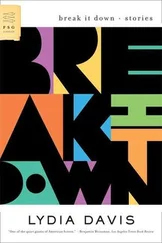Lydia Davis - Almost No Memory
Здесь есть возможность читать онлайн «Lydia Davis - Almost No Memory» весь текст электронной книги совершенно бесплатно (целиком полную версию без сокращений). В некоторых случаях можно слушать аудио, скачать через торрент в формате fb2 и присутствует краткое содержание. Год выпуска: 2001, Издательство: Farrar, Straus and Giroux, Жанр: Современная проза, на английском языке. Описание произведения, (предисловие) а так же отзывы посетителей доступны на портале библиотеки ЛибКат.
- Название:Almost No Memory
- Автор:
- Издательство:Farrar, Straus and Giroux
- Жанр:
- Год:2001
- ISBN:нет данных
- Рейтинг книги:3 / 5. Голосов: 1
-
Избранное:Добавить в избранное
- Отзывы:
-
Ваша оценка:
- 60
- 1
- 2
- 3
- 4
- 5
Almost No Memory: краткое содержание, описание и аннотация
Предлагаем к чтению аннотацию, описание, краткое содержание или предисловие (зависит от того, что написал сам автор книги «Almost No Memory»). Если вы не нашли необходимую информацию о книге — напишите в комментариях, мы постараемся отыскать её.
. In each of these stories, Davis reveals an empathic, sometimes shattering understanding of human relationships.
Almost No Memory — читать онлайн бесплатно полную книгу (весь текст) целиком
Ниже представлен текст книги, разбитый по страницам. Система сохранения места последней прочитанной страницы, позволяет с удобством читать онлайн бесплатно книгу «Almost No Memory», без необходимости каждый раз заново искать на чём Вы остановились. Поставьте закладку, и сможете в любой момент перейти на страницу, на которой закончили чтение.
Интервал:
Закладка:
THE MICE
Mice live in our walls but do not trouble our kitchen. We are pleased but cannot understand why they do not come into our kitchen, where we have traps set, as they come into the kitchens of our neighbors. Although we are pleased, we are also upset, because the mice behave as though there were something wrong with our kitchen. What makes this even more puzzling is that our house is much less tidy than the houses of our neighbors. There is more food lying about in our kitchen, more crumbs on the counters and filthy scraps of onion kicked against the base of the cabinets. In fact, there is so much loose food in the kitchen I can only think the mice themselves are defeated by it. In a tidy kitchen, it is a challenge for them to find enough food night after night to survive until spring. They patiently hunt and nibble hour after hour until they are satisfied. In our kitchen, however, they are faced with something so out of proportion to their experience that they cannot deal with it. They might venture out a few steps, but soon the overwhelming sights and smells drive them back into their holes, uncomfortable and embarrassed at not being able to scavenge as they should.
THE THIRTEENTH WOMAN
In a town of twelve women there was a thirteenth. No one admitted she lived there, no mail came for her, no one spoke of her, no one asked after her, no one sold bread to her, no one bought anything from her, no one returned her glance, no one knocked on her door; the rain did not fall on her, the sun never shone on her, the day never dawned on her, the night never fell for her; for her the weeks did not pass, the years did not roll by; her house was unnumbered, her garden untended, her path not trod upon, her bed not slept in, her food not eaten, her clothes not worn; and yet in spite of all this she continued to live in the town without resenting what it did to her.
THE PROFESSOR
A few years ago, I used to tell myself I wanted to marry a cowboy. Why shouldn’t I say this to myself — living alone, excited by the brown landscape, sometimes noticing a cowboy in a pickup truck in my rearview mirror, as I drove on the broad highways of the West Coast? In fact, I realize I would still like to marry a cowboy, though by now I’m living in the East and married already to someone who is not a cowboy.
But what would a cowboy want with a woman like me — an English professor, the daughter of another English professor, not very easygoing? If I have a drink or two, I’m more easygoing, but I still speak correctly and don’t know how to joke with people unless I know them well, and often these are university people or the people they live with, who also speak correctly. Although I don’t mind them, I feel cut off from all the other people in this country — to mention only this country.
I told myself I liked the way cowboys dressed, starting with the hat, and how comfortable they were in their clothes, so practical, having to do with their work. Many professors seem to dress the way they think a professor should dress, without any real interest or love. Their clothes are too tight or else a few years out of style and just add to the awkwardness of their bodies.
After I was hired to teach for the first time, I bought a briefcase, and then after I started teaching I carried it through the halls like the other professors. I could see that the older professors, mostly men but also some women, were no longer aware of the importance of their briefcases, and that the younger women pretended they weren’t aware of it, but the younger men carried their briefcases like trophies.
At that same time, my father began sending me thick envelopes containing material he thought would help me in my classes, including exercises to assign and quotes to use. I didn’t read more than a few pages sometimes when I was feeling strong. How could an old professor try to teach a young professor? Didn’t he know I wouldn’t be able to carry my briefcase through the halls and say hello to my colleagues and students and then go home and read the instructions of the old professor?
In fact, I liked teaching because I liked telling other people what to do. In those days it seemed clearer to me than it does now that if I did something a certain way, it had to be right for other people, too. I was so convinced of it that my students were convinced, too. Still, though I was a teacher outside, I was something else inside. Some of the old professors were also old professors inside, but inside, I wasn’t even a young professor. I looked like a woman in glasses, but I had dreams of leading a very different kind of life, the life of a woman who would not wear glasses, the kind of woman I saw from a distance now and then in a bar.
Читать дальшеИнтервал:
Закладка:
Похожие книги на «Almost No Memory»
Представляем Вашему вниманию похожие книги на «Almost No Memory» списком для выбора. Мы отобрали схожую по названию и смыслу литературу в надежде предоставить читателям больше вариантов отыскать новые, интересные, ещё непрочитанные произведения.
Обсуждение, отзывы о книге «Almost No Memory» и просто собственные мнения читателей. Оставьте ваши комментарии, напишите, что Вы думаете о произведении, его смысле или главных героях. Укажите что конкретно понравилось, а что нет, и почему Вы так считаете.












